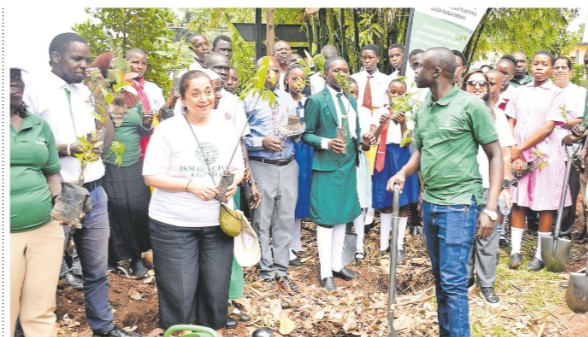Aga Khan foundation launches urban micro-forests campaign

The Aga Khan Development Foundation (AKDF) Uganda launched its Micro-Forests Project at Nakasero Primary School on Tuesday, as part of the broader East Africa Climate Resilience Initiative 2024.
Speaking at the launch, Ms Julia Tops, the AKDF's Regional Partnerships Coordinator for Uganda, said the Grow Micro-Forest Initiative is part of this larger climate resilience effort.
She also revealed plans to introduce the regenerative agriculture programme, Maendeleo, currently adopted in Tanzania and Kenya, along with clean energy and water management pilots.
“Micro-forest planting is a global programme called GROW. It’s a nature-based solution that helps communities combat climate change while providing them with livelihood opportunities,” Ms Tops said.
She added that in 2023, AKDF planted 8.8 million trees globally. She emphasised that the green spaces created by these micro-forests can be used as interactive, inclusive learning environments where students can study subjects such as biology and geography.
Mr Henry Ssendagire, the AKDF Uganda’s Climate Resilience Coordinator, explained that the Micro-Forests Project was first piloted in 2023 in ten Kampala schools under the AKF Schools 2030 program.
This year, the initiative has expanded with 80 new micro-forests planted—50 in Jinja, 20 in Arua, and 10 more in Kampala—bringing the total to 90 across Uganda. The aim is to promote climate change mitigation in targeted institutions.
Ssendagire highlighted the project's focus on utilising any available land in schools to plant indigenous tree species, including medicinal, fodder, fruit, and food trees. The trees are densely planted in small areas, using a minimum of 25 species to ensure biodiversity.
“The idea of a micro-forest is like a normal forest but faster-growing and in a smaller space, as small as 100 square metres. We encourage everyone to establish domestic forests,” he said.
Mr Gerald Mujassi, the head teacher of Nakasero Primary School, expressed gratitude to the AKDF for launching the project just eight months after his appointment.
He stressed the benefits of green, clean environments, noting that they contribute to healthy students, good academic performance, and overall cleanliness. Mr Mujassi shared his experience establishing green compounds in schools where he previously served and expressed hope that Nakasero Primary will become a model green school for KCCA institutions.
Mr Daniel Padde, an Urban Forester from the Kampala Capital City Authority (KCCA), welcomed the initiative. Representing the Director of Physical Planning, he noted that when AKF proposed establishing micro-forests in city schools, KCCA readily supported the idea.
“This aligns with our strategic plan (2020-2025) to increase urban tree density by 11 percent through our Urban Forestry Programme. Partnerships, like this one with AKF, are crucial to our beautification and greening agenda,” Mr Padde said.
He also highlighted the importance of trees in providing clean air, beautifying the environment, offering medicinal benefits, and supporting urban agriculture. Mr Padde added that through the city’s biodiversity project, KCCA is partnering with AKDF to plant a micro-forest in Kyanja, a city suburb with a wetland threatened by encroachment.



0 Comments